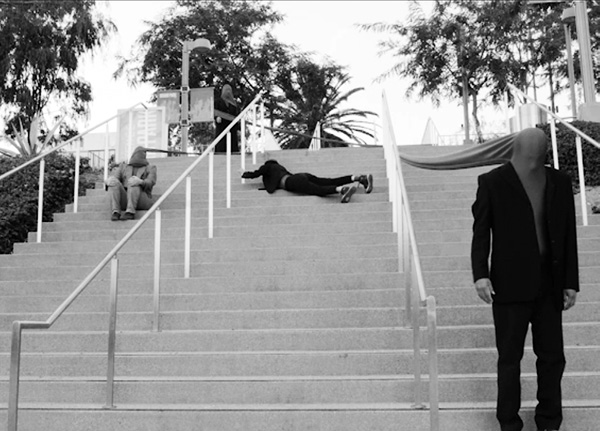
BLIND ENGAGEMENT
first performed on June 29, 2016
7a*11d, Toronto, Canada
performed four times in 2016
CAROL MONTEALEGRE
Luis Guizar, Marissa Magdalena, Marshall Astor, Eduardo Robles
New York, NY / Mexico City, Mexico
391024640c391024640a391024640r391024640o391024640l391024640a391024640m391024640o391024640n391024640t391024640e391024640a391024640@391024640g391024640m391024640a391024640i391024640l391024640.391024640c391024640o391024640m
flickr.com/photos/carol_montealegre
BLIND ENGAGEMENT
CAROL MONTEALEGRE
This was an experience that was dreamt before it was experienced.
How do we connect with others?
How do our bodies communicate without words?
How do we experience chemistry, synchronicity, understanding, and misunderstanding?
Bound to another person and blindfolded by stretched red fabric which was covered by our societal suits, we had to find clarity and connection in our paths of confusion and anxiety.
Just as a blind date puts strangers into unfamiliar territory and forced improvisation, we had not known each other before the date of our action.
Over the course of the three-hour performance we experienced alternating sensations of peace and anxiety, awkwardness and fluidity, and an altered sense of time and dimension.
“Blind Engagement” is a study in the complexities of human interaction, growth of the individual in an ever-increasing environment of isolation, and the subsequent dependence on trust as a means of freedom. By navigating various obstacles while invisibly connected to another person, who is simultaneously struggling to maneuver through their own impediments, we are mirroring the process of growth through struggle that every person must experience in life and in relationships with others. During the course of this piece, we developed a sensitivity to our partner’s movements and needs. At times we felt the influence of our partner’s actions, at other times we felt free to explore our own capacity for movement in the solitude of our blindness. The freedom of being unaware of spectators was tempered by the need to stay close to familiar objects and distance ourselves from unseen dangers. The freedom of being ignorant of our surroundings was offset by claustrophobia of having no visual awareness of space, and being constantly faced with our own thoughts and breath. Our eventual freedom was discovered in an expanded space where we found that the act of care for the other—waiting, and listening—could allow us to play, to roll around, to dance, and to move into a wider consciousness.